A Dissertation on the Evolution of Russian Military Power Post-WWII
VerifiedAdded on 2022/11/30
|69
|20636
|416
Thesis and Dissertation
AI Summary
This dissertation investigates the evolution of Russian military power following the Second World War. It explores the significance of military power for nation-states, analyzing how Russia's military was affected by global changes. The research examines the evolution of Russian military power from the World Wars through the 21st century, providing insights into its historical development and the impact of events like the Cold War. The study employs positivism research philosophy, a deductive research design, a descriptive research approach, and qualitative data analysis to understand the changes in Russia's military capabilities, its strategic importance, and its adaptation to the evolving global landscape. The dissertation includes a detailed literature review, outlines the research methodology, analyzes data thematically, and concludes with recommendations for enhancing military power to improve the lives of citizens. The research also addresses limitations and suggests areas for future study.
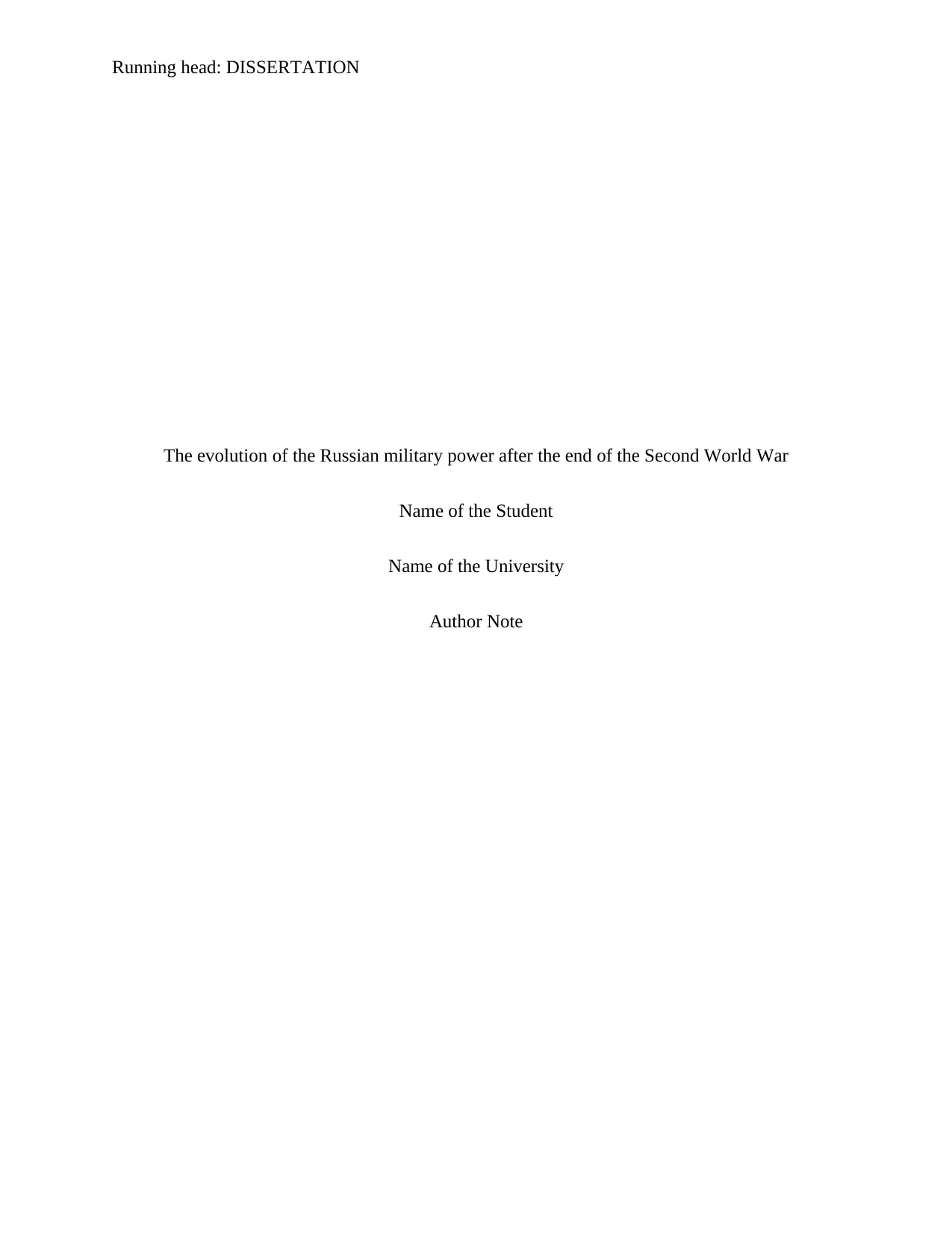
Running head: DISSERTATION
The evolution of the Russian military power after the end of the Second World War
Name of the Student
Name of the University
Author Note
The evolution of the Russian military power after the end of the Second World War
Name of the Student
Name of the University
Author Note
Paraphrase This Document
Need a fresh take? Get an instant paraphrase of this document with our AI Paraphraser
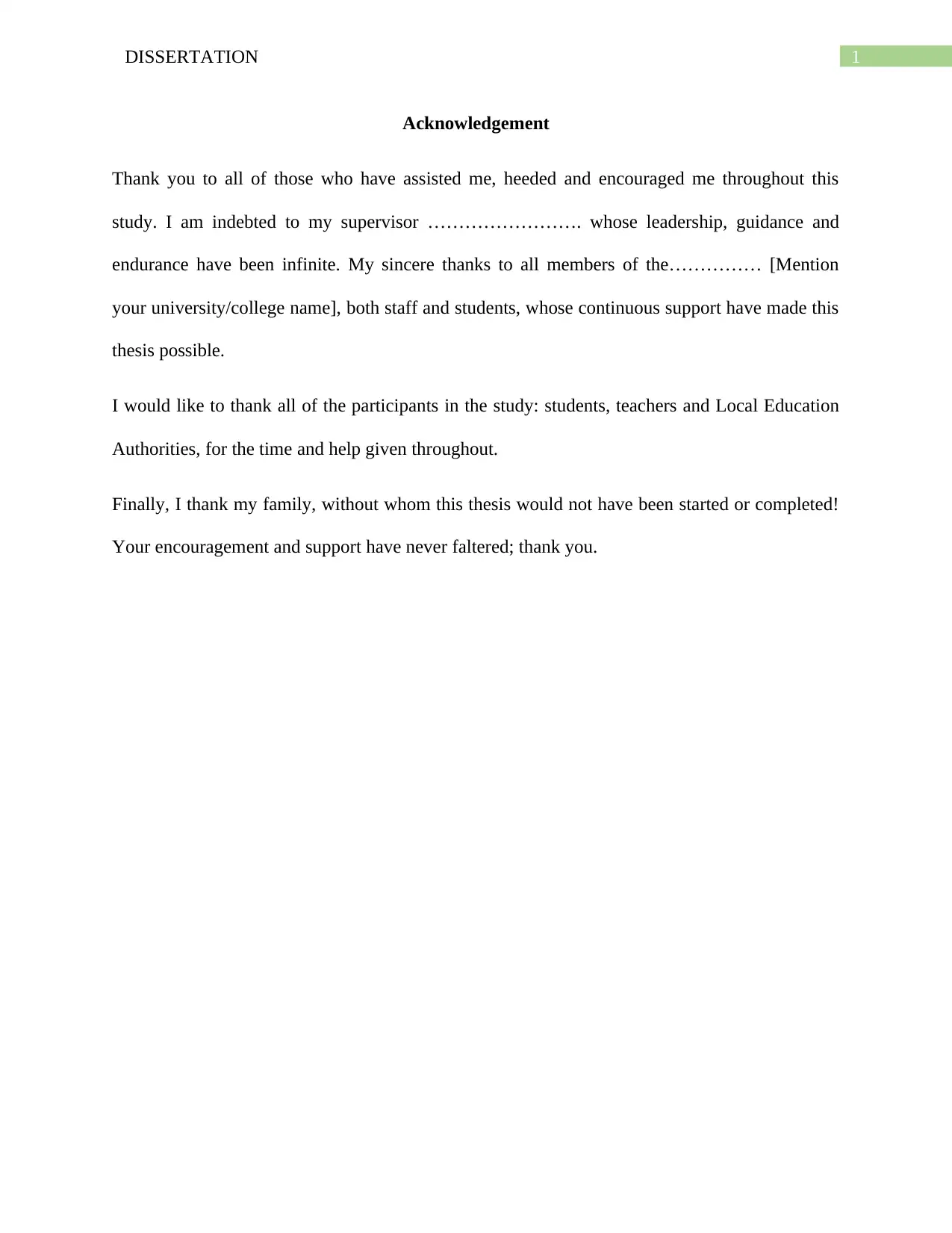
1DISSERTATION
Acknowledgement
Thank you to all of those who have assisted me, heeded and encouraged me throughout this
study. I am indebted to my supervisor ……………………. whose leadership, guidance and
endurance have been infinite. My sincere thanks to all members of the…………… [Mention
your university/college name], both staff and students, whose continuous support have made this
thesis possible.
I would like to thank all of the participants in the study: students, teachers and Local Education
Authorities, for the time and help given throughout.
Finally, I thank my family, without whom this thesis would not have been started or completed!
Your encouragement and support have never faltered; thank you.
Acknowledgement
Thank you to all of those who have assisted me, heeded and encouraged me throughout this
study. I am indebted to my supervisor ……………………. whose leadership, guidance and
endurance have been infinite. My sincere thanks to all members of the…………… [Mention
your university/college name], both staff and students, whose continuous support have made this
thesis possible.
I would like to thank all of the participants in the study: students, teachers and Local Education
Authorities, for the time and help given throughout.
Finally, I thank my family, without whom this thesis would not have been started or completed!
Your encouragement and support have never faltered; thank you.
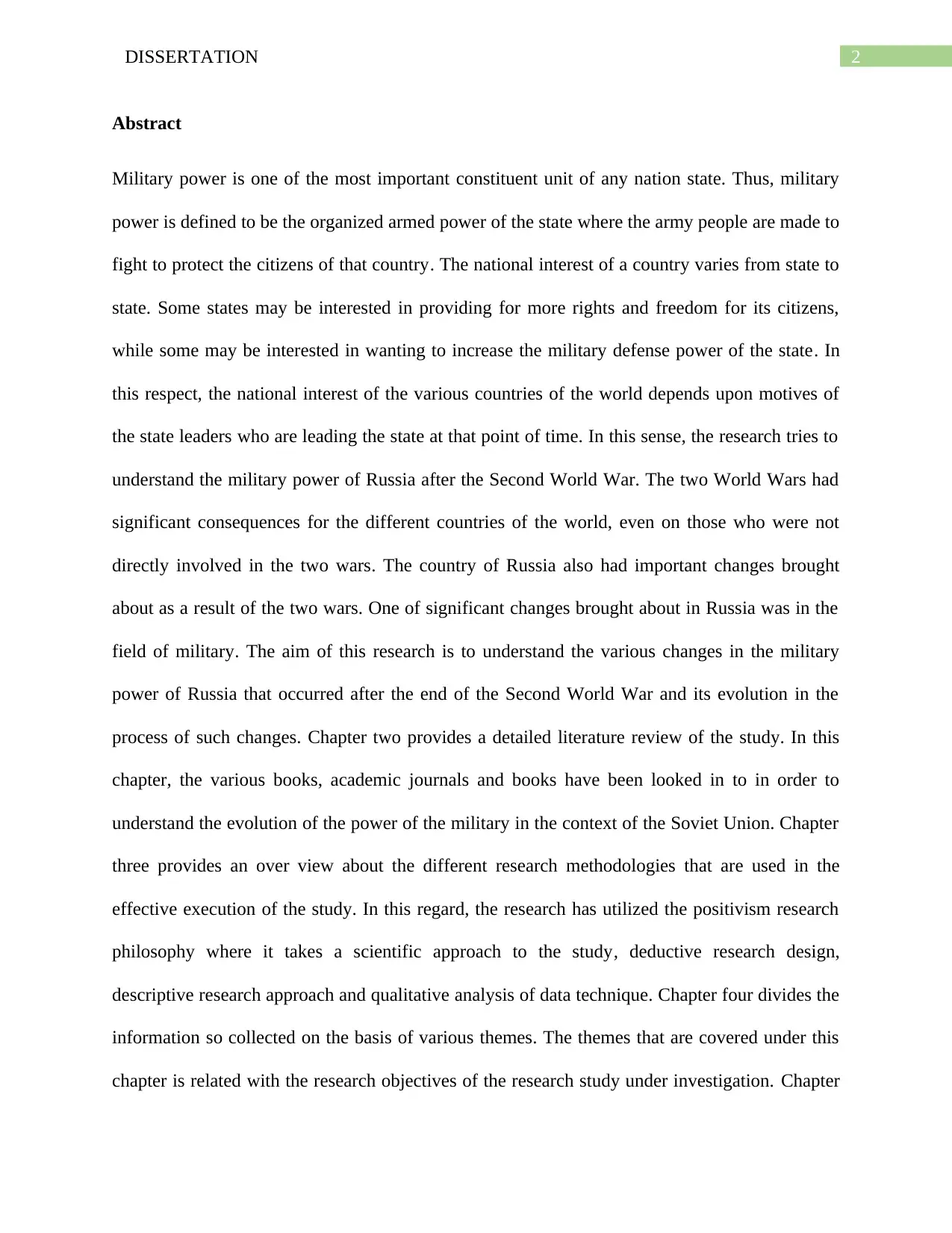
2DISSERTATION
Abstract
Military power is one of the most important constituent unit of any nation state. Thus, military
power is defined to be the organized armed power of the state where the army people are made to
fight to protect the citizens of that country. The national interest of a country varies from state to
state. Some states may be interested in providing for more rights and freedom for its citizens,
while some may be interested in wanting to increase the military defense power of the state. In
this respect, the national interest of the various countries of the world depends upon motives of
the state leaders who are leading the state at that point of time. In this sense, the research tries to
understand the military power of Russia after the Second World War. The two World Wars had
significant consequences for the different countries of the world, even on those who were not
directly involved in the two wars. The country of Russia also had important changes brought
about as a result of the two wars. One of significant changes brought about in Russia was in the
field of military. The aim of this research is to understand the various changes in the military
power of Russia that occurred after the end of the Second World War and its evolution in the
process of such changes. Chapter two provides a detailed literature review of the study. In this
chapter, the various books, academic journals and books have been looked in to in order to
understand the evolution of the power of the military in the context of the Soviet Union. Chapter
three provides an over view about the different research methodologies that are used in the
effective execution of the study. In this regard, the research has utilized the positivism research
philosophy where it takes a scientific approach to the study, deductive research design,
descriptive research approach and qualitative analysis of data technique. Chapter four divides the
information so collected on the basis of various themes. The themes that are covered under this
chapter is related with the research objectives of the research study under investigation. Chapter
Abstract
Military power is one of the most important constituent unit of any nation state. Thus, military
power is defined to be the organized armed power of the state where the army people are made to
fight to protect the citizens of that country. The national interest of a country varies from state to
state. Some states may be interested in providing for more rights and freedom for its citizens,
while some may be interested in wanting to increase the military defense power of the state. In
this respect, the national interest of the various countries of the world depends upon motives of
the state leaders who are leading the state at that point of time. In this sense, the research tries to
understand the military power of Russia after the Second World War. The two World Wars had
significant consequences for the different countries of the world, even on those who were not
directly involved in the two wars. The country of Russia also had important changes brought
about as a result of the two wars. One of significant changes brought about in Russia was in the
field of military. The aim of this research is to understand the various changes in the military
power of Russia that occurred after the end of the Second World War and its evolution in the
process of such changes. Chapter two provides a detailed literature review of the study. In this
chapter, the various books, academic journals and books have been looked in to in order to
understand the evolution of the power of the military in the context of the Soviet Union. Chapter
three provides an over view about the different research methodologies that are used in the
effective execution of the study. In this regard, the research has utilized the positivism research
philosophy where it takes a scientific approach to the study, deductive research design,
descriptive research approach and qualitative analysis of data technique. Chapter four divides the
information so collected on the basis of various themes. The themes that are covered under this
chapter is related with the research objectives of the research study under investigation. Chapter
⊘ This is a preview!⊘
Do you want full access?
Subscribe today to unlock all pages.

Trusted by 1+ million students worldwide
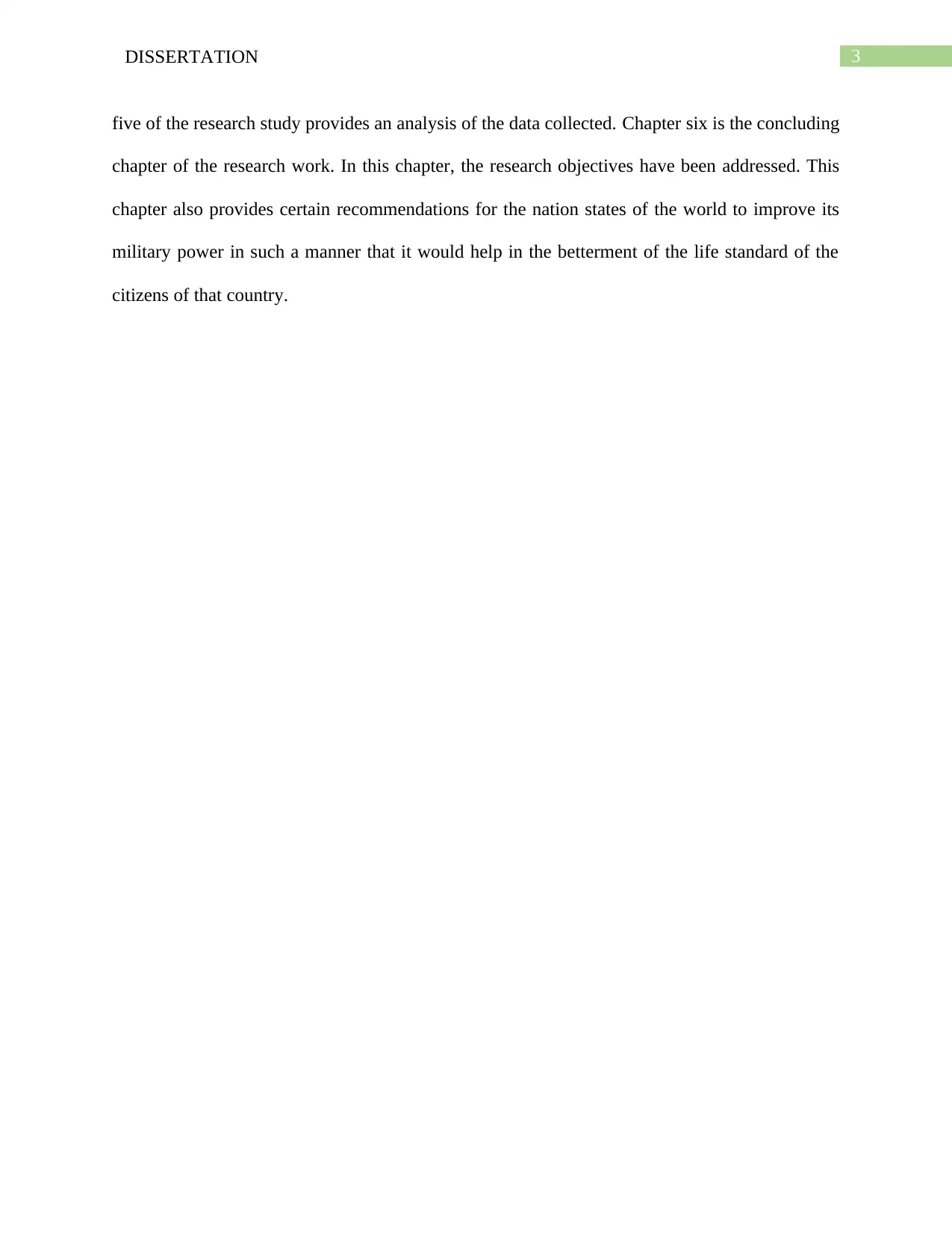
3DISSERTATION
five of the research study provides an analysis of the data collected. Chapter six is the concluding
chapter of the research work. In this chapter, the research objectives have been addressed. This
chapter also provides certain recommendations for the nation states of the world to improve its
military power in such a manner that it would help in the betterment of the life standard of the
citizens of that country.
five of the research study provides an analysis of the data collected. Chapter six is the concluding
chapter of the research work. In this chapter, the research objectives have been addressed. This
chapter also provides certain recommendations for the nation states of the world to improve its
military power in such a manner that it would help in the betterment of the life standard of the
citizens of that country.
Paraphrase This Document
Need a fresh take? Get an instant paraphrase of this document with our AI Paraphraser
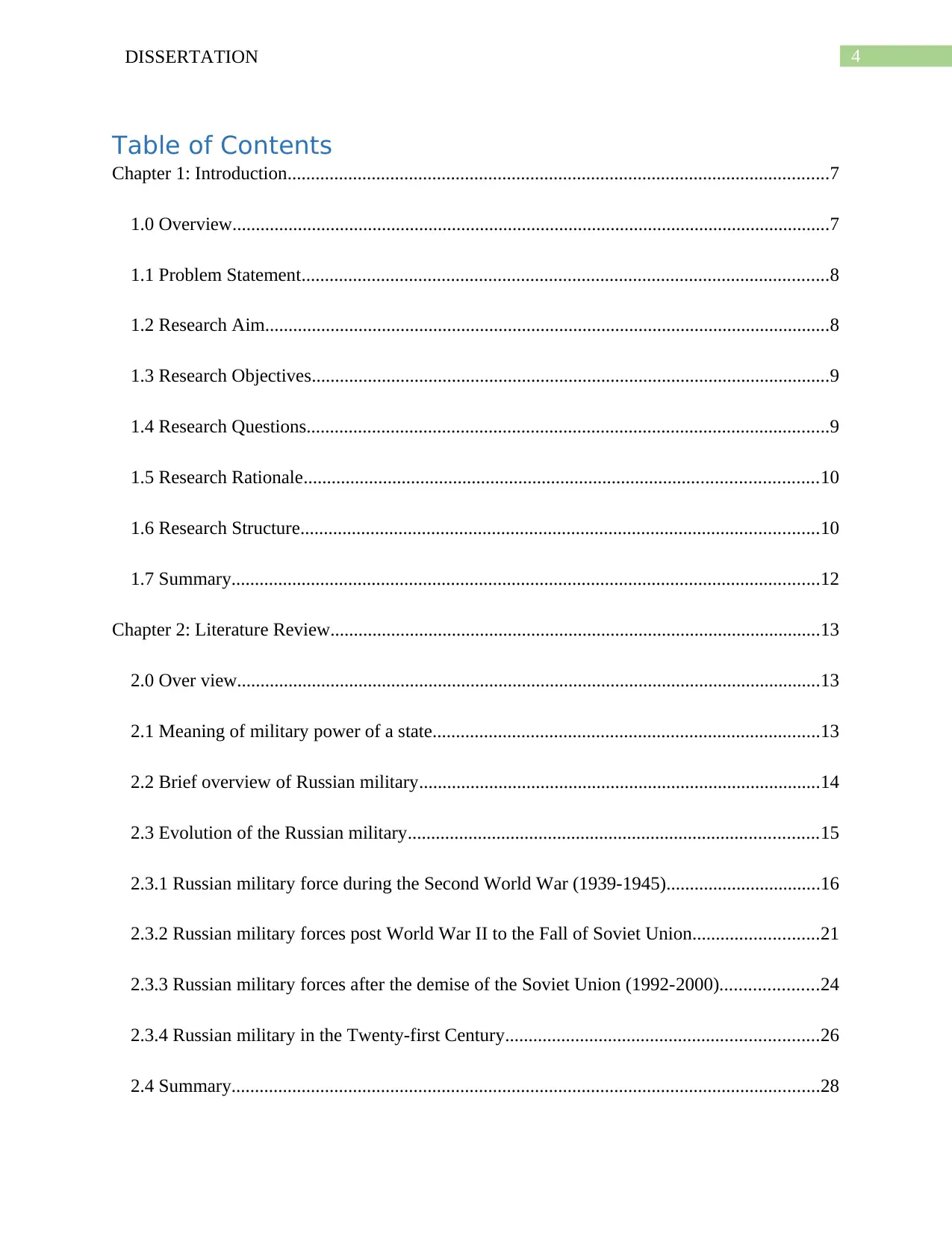
4DISSERTATION
Table of Contents
Chapter 1: Introduction....................................................................................................................7
1.0 Overview................................................................................................................................7
1.1 Problem Statement.................................................................................................................8
1.2 Research Aim.........................................................................................................................8
1.3 Research Objectives...............................................................................................................9
1.4 Research Questions................................................................................................................9
1.5 Research Rationale..............................................................................................................10
1.6 Research Structure...............................................................................................................10
1.7 Summary..............................................................................................................................12
Chapter 2: Literature Review.........................................................................................................13
2.0 Over view.............................................................................................................................13
2.1 Meaning of military power of a state...................................................................................13
2.2 Brief overview of Russian military......................................................................................14
2.3 Evolution of the Russian military........................................................................................15
2.3.1 Russian military force during the Second World War (1939-1945).................................16
2.3.2 Russian military forces post World War II to the Fall of Soviet Union...........................21
2.3.3 Russian military forces after the demise of the Soviet Union (1992-2000).....................24
2.3.4 Russian military in the Twenty-first Century...................................................................26
2.4 Summary..............................................................................................................................28
Table of Contents
Chapter 1: Introduction....................................................................................................................7
1.0 Overview................................................................................................................................7
1.1 Problem Statement.................................................................................................................8
1.2 Research Aim.........................................................................................................................8
1.3 Research Objectives...............................................................................................................9
1.4 Research Questions................................................................................................................9
1.5 Research Rationale..............................................................................................................10
1.6 Research Structure...............................................................................................................10
1.7 Summary..............................................................................................................................12
Chapter 2: Literature Review.........................................................................................................13
2.0 Over view.............................................................................................................................13
2.1 Meaning of military power of a state...................................................................................13
2.2 Brief overview of Russian military......................................................................................14
2.3 Evolution of the Russian military........................................................................................15
2.3.1 Russian military force during the Second World War (1939-1945).................................16
2.3.2 Russian military forces post World War II to the Fall of Soviet Union...........................21
2.3.3 Russian military forces after the demise of the Soviet Union (1992-2000).....................24
2.3.4 Russian military in the Twenty-first Century...................................................................26
2.4 Summary..............................................................................................................................28
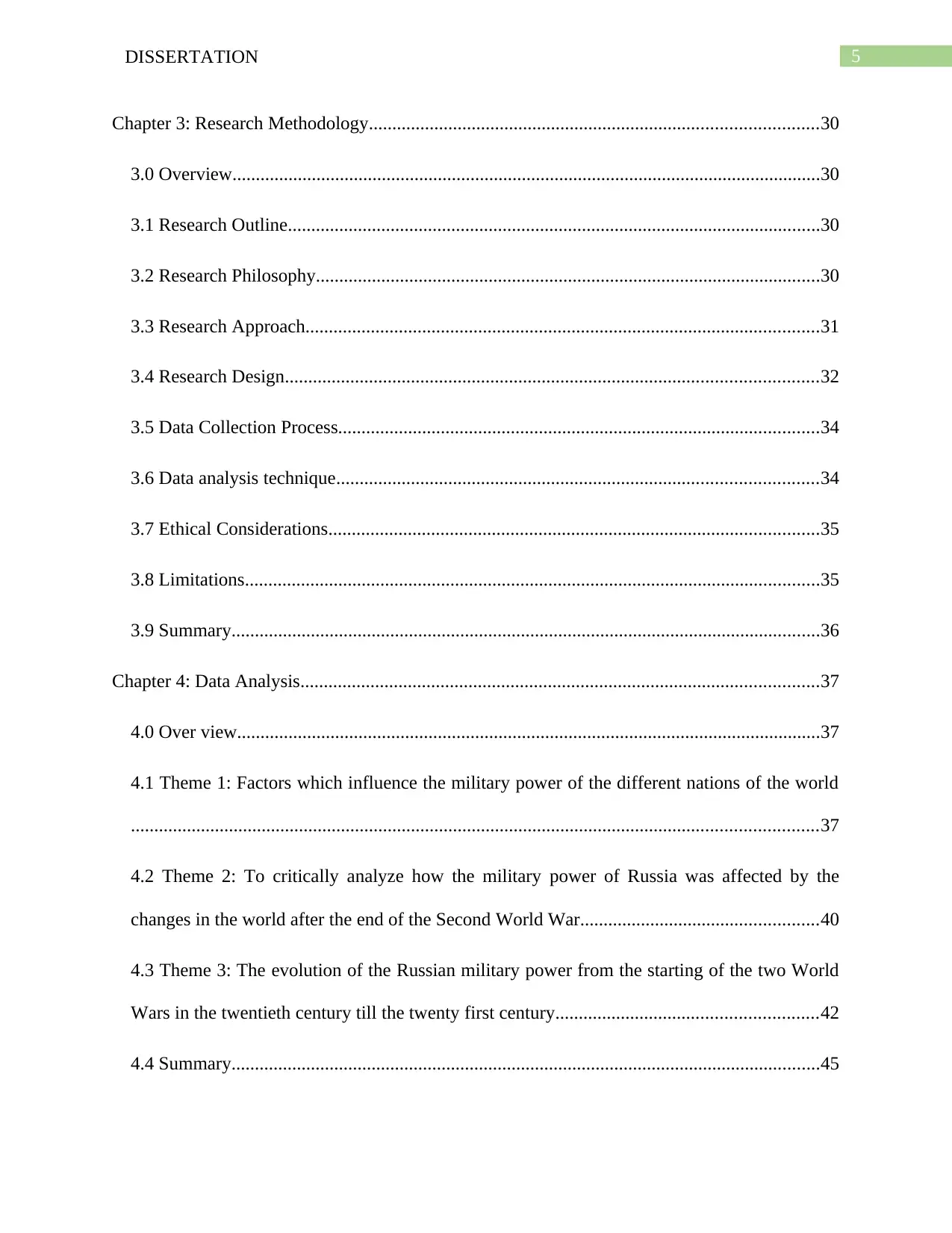
5DISSERTATION
Chapter 3: Research Methodology................................................................................................30
3.0 Overview..............................................................................................................................30
3.1 Research Outline..................................................................................................................30
3.2 Research Philosophy............................................................................................................30
3.3 Research Approach..............................................................................................................31
3.4 Research Design..................................................................................................................32
3.5 Data Collection Process.......................................................................................................34
3.6 Data analysis technique.......................................................................................................34
3.7 Ethical Considerations.........................................................................................................35
3.8 Limitations...........................................................................................................................35
3.9 Summary..............................................................................................................................36
Chapter 4: Data Analysis...............................................................................................................37
4.0 Over view.............................................................................................................................37
4.1 Theme 1: Factors which influence the military power of the different nations of the world
...................................................................................................................................................37
4.2 Theme 2: To critically analyze how the military power of Russia was affected by the
changes in the world after the end of the Second World War...................................................40
4.3 Theme 3: The evolution of the Russian military power from the starting of the two World
Wars in the twentieth century till the twenty first century........................................................42
4.4 Summary..............................................................................................................................45
Chapter 3: Research Methodology................................................................................................30
3.0 Overview..............................................................................................................................30
3.1 Research Outline..................................................................................................................30
3.2 Research Philosophy............................................................................................................30
3.3 Research Approach..............................................................................................................31
3.4 Research Design..................................................................................................................32
3.5 Data Collection Process.......................................................................................................34
3.6 Data analysis technique.......................................................................................................34
3.7 Ethical Considerations.........................................................................................................35
3.8 Limitations...........................................................................................................................35
3.9 Summary..............................................................................................................................36
Chapter 4: Data Analysis...............................................................................................................37
4.0 Over view.............................................................................................................................37
4.1 Theme 1: Factors which influence the military power of the different nations of the world
...................................................................................................................................................37
4.2 Theme 2: To critically analyze how the military power of Russia was affected by the
changes in the world after the end of the Second World War...................................................40
4.3 Theme 3: The evolution of the Russian military power from the starting of the two World
Wars in the twentieth century till the twenty first century........................................................42
4.4 Summary..............................................................................................................................45
⊘ This is a preview!⊘
Do you want full access?
Subscribe today to unlock all pages.

Trusted by 1+ million students worldwide
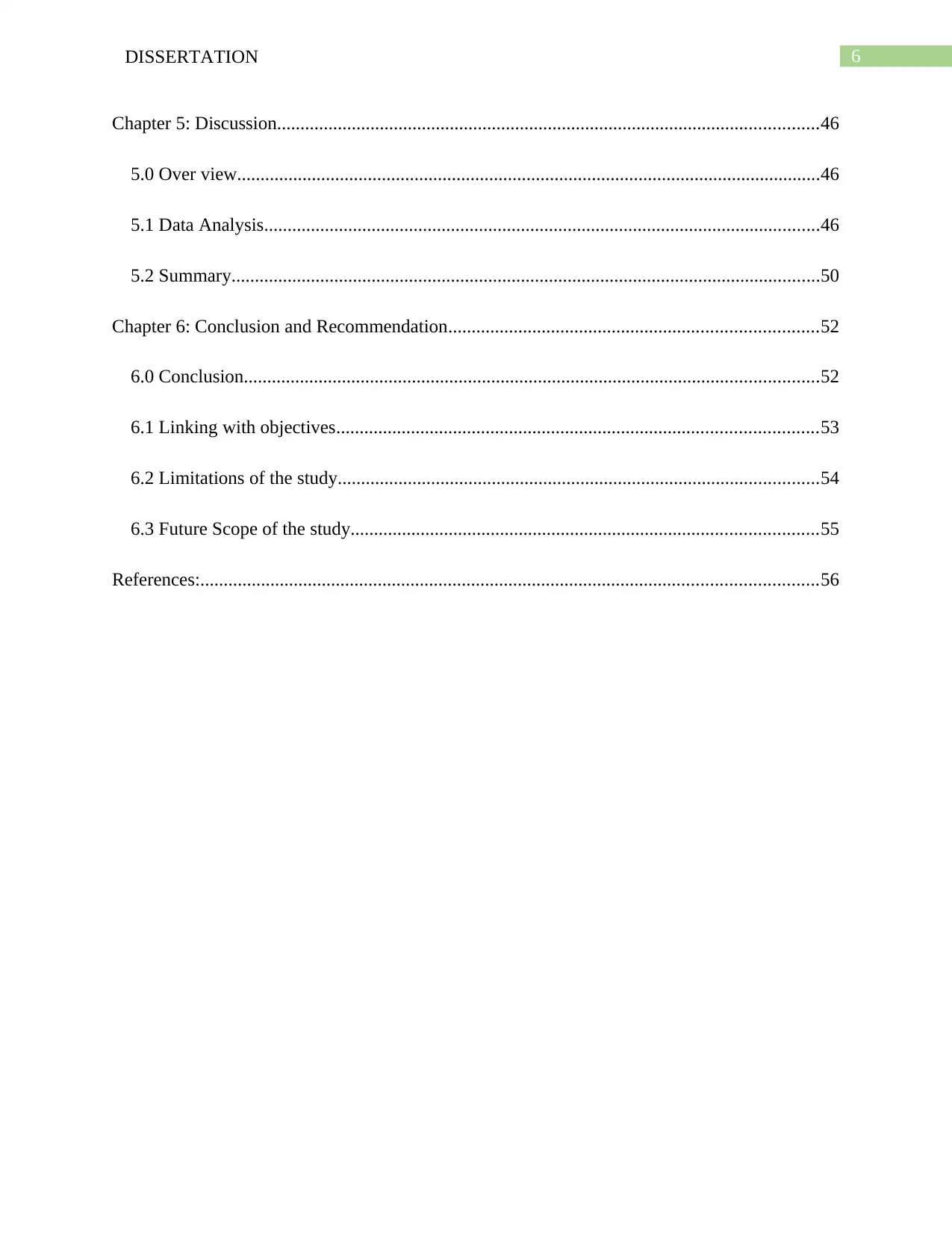
6DISSERTATION
Chapter 5: Discussion....................................................................................................................46
5.0 Over view.............................................................................................................................46
5.1 Data Analysis.......................................................................................................................46
5.2 Summary..............................................................................................................................50
Chapter 6: Conclusion and Recommendation...............................................................................52
6.0 Conclusion...........................................................................................................................52
6.1 Linking with objectives.......................................................................................................53
6.2 Limitations of the study.......................................................................................................54
6.3 Future Scope of the study....................................................................................................55
References:....................................................................................................................................56
Chapter 5: Discussion....................................................................................................................46
5.0 Over view.............................................................................................................................46
5.1 Data Analysis.......................................................................................................................46
5.2 Summary..............................................................................................................................50
Chapter 6: Conclusion and Recommendation...............................................................................52
6.0 Conclusion...........................................................................................................................52
6.1 Linking with objectives.......................................................................................................53
6.2 Limitations of the study.......................................................................................................54
6.3 Future Scope of the study....................................................................................................55
References:....................................................................................................................................56
Paraphrase This Document
Need a fresh take? Get an instant paraphrase of this document with our AI Paraphraser
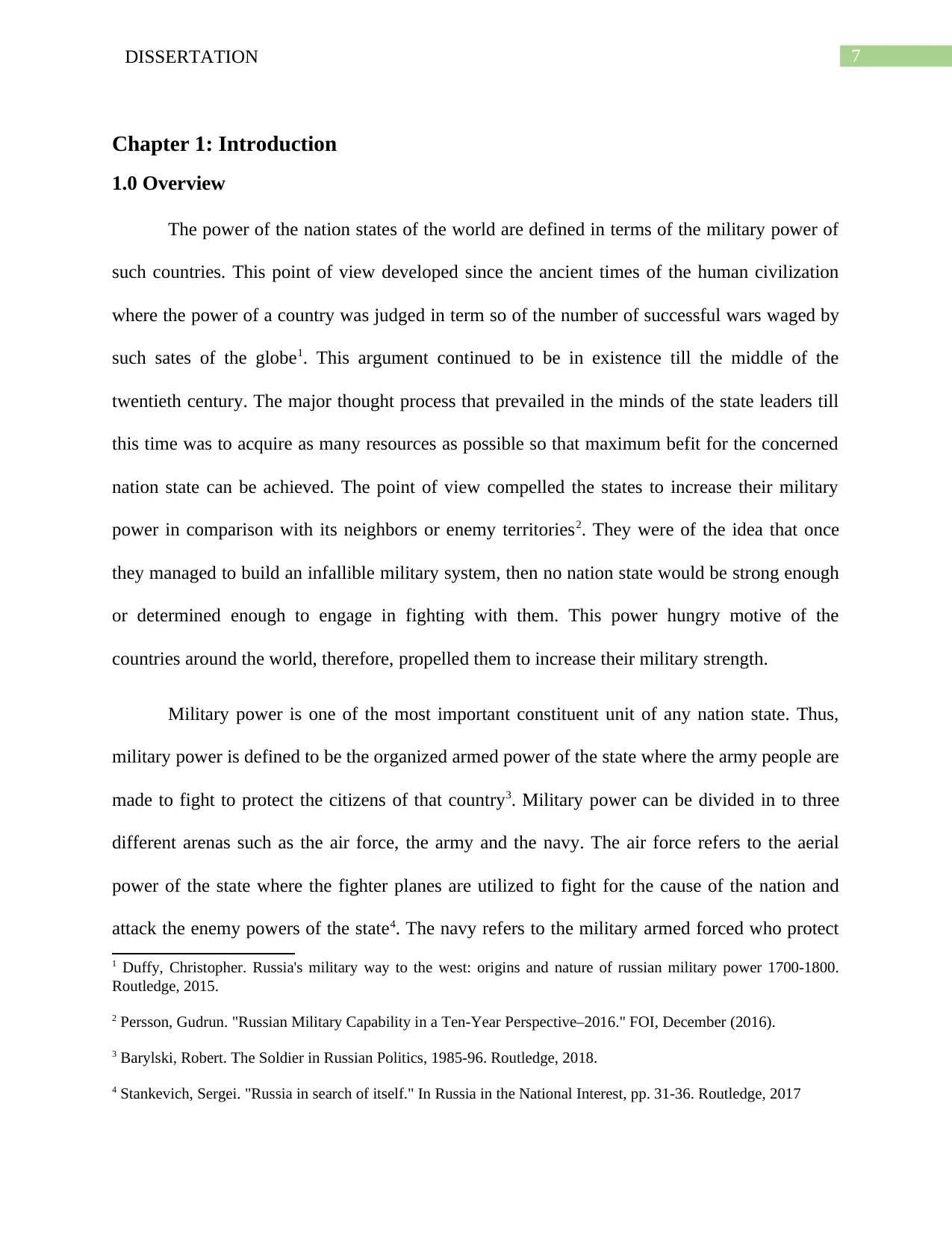
7DISSERTATION
Chapter 1: Introduction
1.0 Overview
The power of the nation states of the world are defined in terms of the military power of
such countries. This point of view developed since the ancient times of the human civilization
where the power of a country was judged in term so of the number of successful wars waged by
such sates of the globe1. This argument continued to be in existence till the middle of the
twentieth century. The major thought process that prevailed in the minds of the state leaders till
this time was to acquire as many resources as possible so that maximum befit for the concerned
nation state can be achieved. The point of view compelled the states to increase their military
power in comparison with its neighbors or enemy territories2. They were of the idea that once
they managed to build an infallible military system, then no nation state would be strong enough
or determined enough to engage in fighting with them. This power hungry motive of the
countries around the world, therefore, propelled them to increase their military strength.
Military power is one of the most important constituent unit of any nation state. Thus,
military power is defined to be the organized armed power of the state where the army people are
made to fight to protect the citizens of that country3. Military power can be divided in to three
different arenas such as the air force, the army and the navy. The air force refers to the aerial
power of the state where the fighter planes are utilized to fight for the cause of the nation and
attack the enemy powers of the state4. The navy refers to the military armed forced who protect
1 Duffy, Christopher. Russia's military way to the west: origins and nature of russian military power 1700-1800.
Routledge, 2015.
2 Persson, Gudrun. "Russian Military Capability in a Ten-Year Perspective–2016." FOI, December (2016).
3 Barylski, Robert. The Soldier in Russian Politics, 1985-96. Routledge, 2018.
4 Stankevich, Sergei. "Russia in search of itself." In Russia in the National Interest, pp. 31-36. Routledge, 2017
Chapter 1: Introduction
1.0 Overview
The power of the nation states of the world are defined in terms of the military power of
such countries. This point of view developed since the ancient times of the human civilization
where the power of a country was judged in term so of the number of successful wars waged by
such sates of the globe1. This argument continued to be in existence till the middle of the
twentieth century. The major thought process that prevailed in the minds of the state leaders till
this time was to acquire as many resources as possible so that maximum befit for the concerned
nation state can be achieved. The point of view compelled the states to increase their military
power in comparison with its neighbors or enemy territories2. They were of the idea that once
they managed to build an infallible military system, then no nation state would be strong enough
or determined enough to engage in fighting with them. This power hungry motive of the
countries around the world, therefore, propelled them to increase their military strength.
Military power is one of the most important constituent unit of any nation state. Thus,
military power is defined to be the organized armed power of the state where the army people are
made to fight to protect the citizens of that country3. Military power can be divided in to three
different arenas such as the air force, the army and the navy. The air force refers to the aerial
power of the state where the fighter planes are utilized to fight for the cause of the nation and
attack the enemy powers of the state4. The navy refers to the military armed forced who protect
1 Duffy, Christopher. Russia's military way to the west: origins and nature of russian military power 1700-1800.
Routledge, 2015.
2 Persson, Gudrun. "Russian Military Capability in a Ten-Year Perspective–2016." FOI, December (2016).
3 Barylski, Robert. The Soldier in Russian Politics, 1985-96. Routledge, 2018.
4 Stankevich, Sergei. "Russia in search of itself." In Russia in the National Interest, pp. 31-36. Routledge, 2017
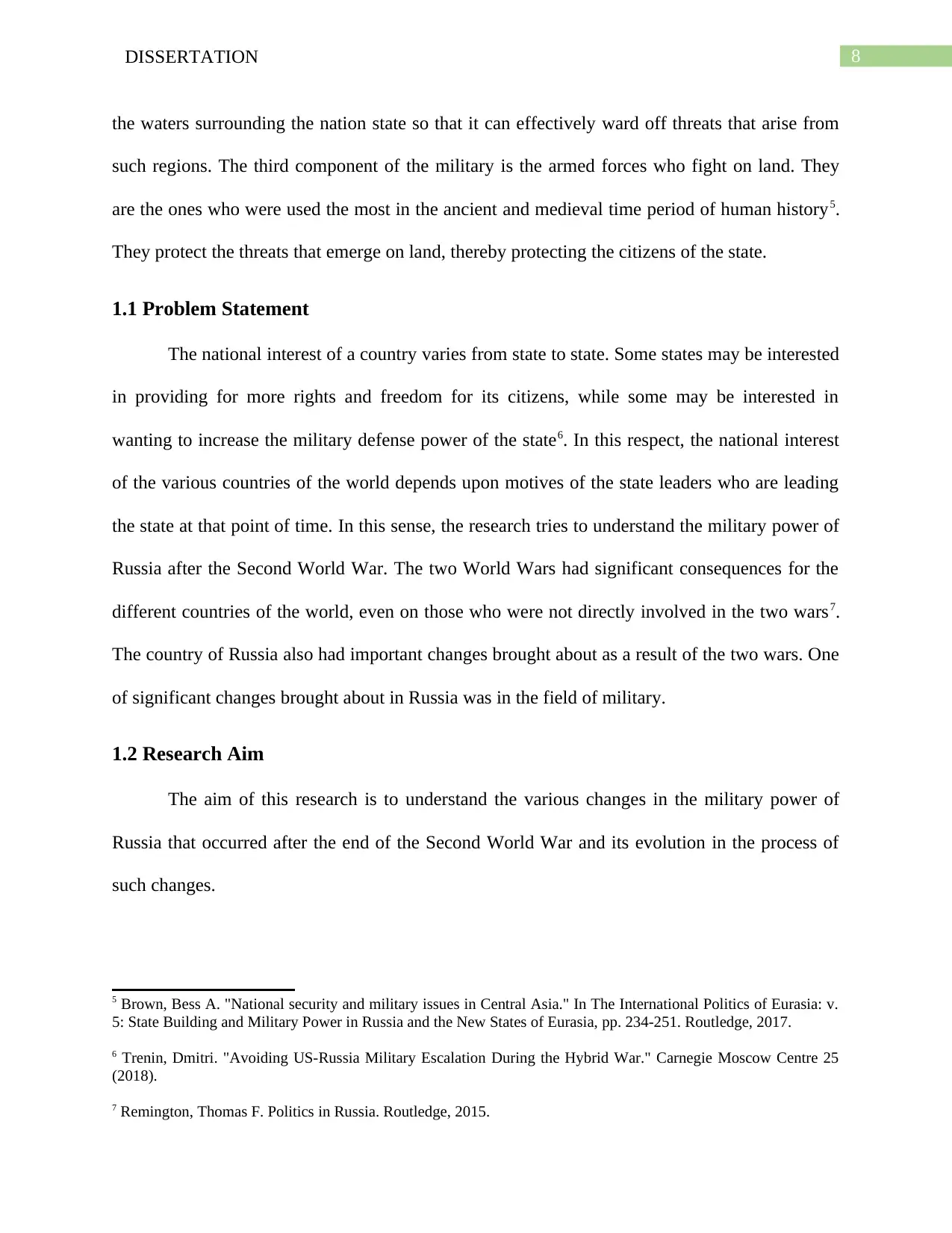
8DISSERTATION
the waters surrounding the nation state so that it can effectively ward off threats that arise from
such regions. The third component of the military is the armed forces who fight on land. They
are the ones who were used the most in the ancient and medieval time period of human history5.
They protect the threats that emerge on land, thereby protecting the citizens of the state.
1.1 Problem Statement
The national interest of a country varies from state to state. Some states may be interested
in providing for more rights and freedom for its citizens, while some may be interested in
wanting to increase the military defense power of the state6. In this respect, the national interest
of the various countries of the world depends upon motives of the state leaders who are leading
the state at that point of time. In this sense, the research tries to understand the military power of
Russia after the Second World War. The two World Wars had significant consequences for the
different countries of the world, even on those who were not directly involved in the two wars7.
The country of Russia also had important changes brought about as a result of the two wars. One
of significant changes brought about in Russia was in the field of military.
1.2 Research Aim
The aim of this research is to understand the various changes in the military power of
Russia that occurred after the end of the Second World War and its evolution in the process of
such changes.
5 Brown, Bess A. "National security and military issues in Central Asia." In The International Politics of Eurasia: v.
5: State Building and Military Power in Russia and the New States of Eurasia, pp. 234-251. Routledge, 2017.
6 Trenin, Dmitri. "Avoiding US-Russia Military Escalation During the Hybrid War." Carnegie Moscow Centre 25
(2018).
7 Remington, Thomas F. Politics in Russia. Routledge, 2015.
the waters surrounding the nation state so that it can effectively ward off threats that arise from
such regions. The third component of the military is the armed forces who fight on land. They
are the ones who were used the most in the ancient and medieval time period of human history5.
They protect the threats that emerge on land, thereby protecting the citizens of the state.
1.1 Problem Statement
The national interest of a country varies from state to state. Some states may be interested
in providing for more rights and freedom for its citizens, while some may be interested in
wanting to increase the military defense power of the state6. In this respect, the national interest
of the various countries of the world depends upon motives of the state leaders who are leading
the state at that point of time. In this sense, the research tries to understand the military power of
Russia after the Second World War. The two World Wars had significant consequences for the
different countries of the world, even on those who were not directly involved in the two wars7.
The country of Russia also had important changes brought about as a result of the two wars. One
of significant changes brought about in Russia was in the field of military.
1.2 Research Aim
The aim of this research is to understand the various changes in the military power of
Russia that occurred after the end of the Second World War and its evolution in the process of
such changes.
5 Brown, Bess A. "National security and military issues in Central Asia." In The International Politics of Eurasia: v.
5: State Building and Military Power in Russia and the New States of Eurasia, pp. 234-251. Routledge, 2017.
6 Trenin, Dmitri. "Avoiding US-Russia Military Escalation During the Hybrid War." Carnegie Moscow Centre 25
(2018).
7 Remington, Thomas F. Politics in Russia. Routledge, 2015.
⊘ This is a preview!⊘
Do you want full access?
Subscribe today to unlock all pages.

Trusted by 1+ million students worldwide
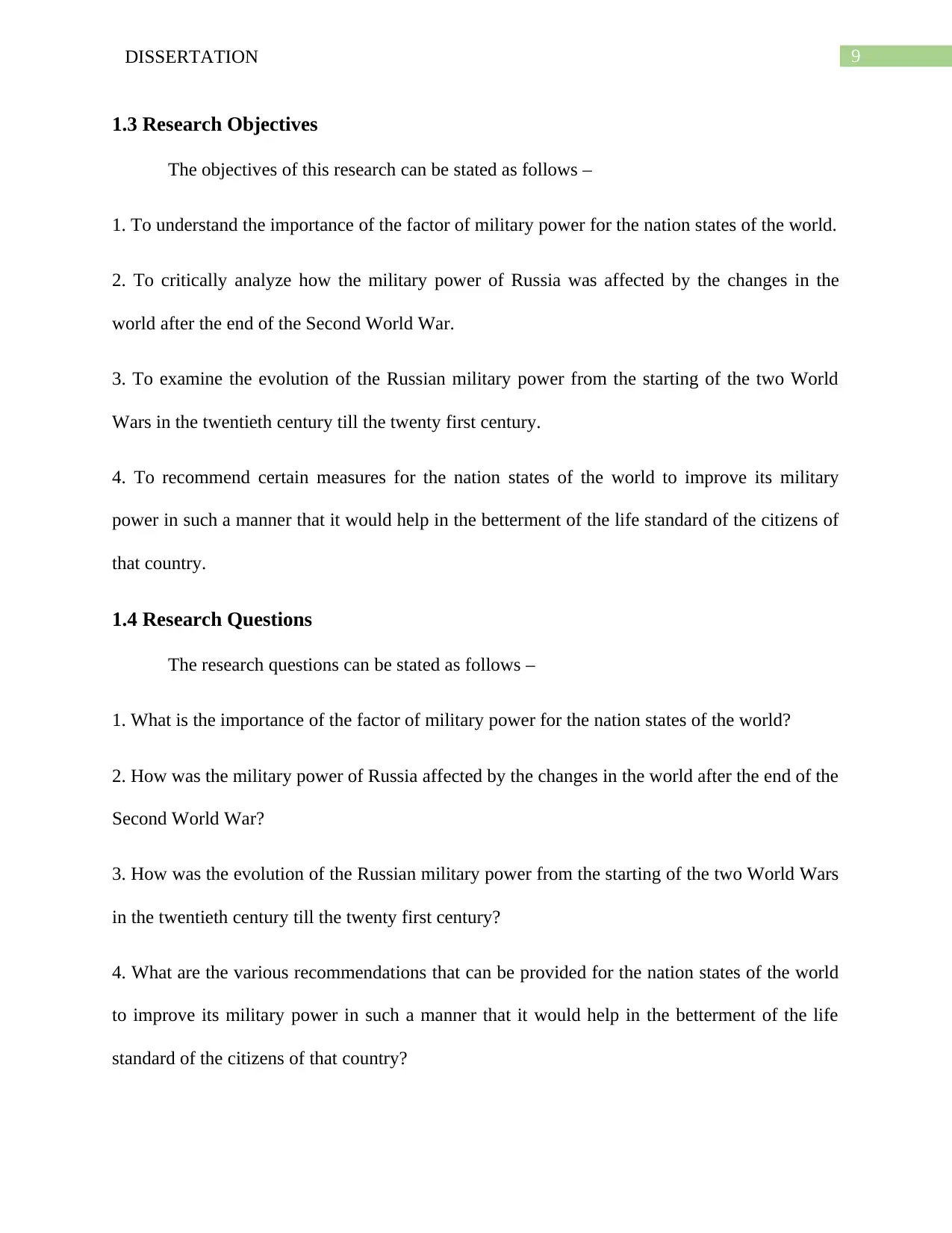
9DISSERTATION
1.3 Research Objectives
The objectives of this research can be stated as follows –
1. To understand the importance of the factor of military power for the nation states of the world.
2. To critically analyze how the military power of Russia was affected by the changes in the
world after the end of the Second World War.
3. To examine the evolution of the Russian military power from the starting of the two World
Wars in the twentieth century till the twenty first century.
4. To recommend certain measures for the nation states of the world to improve its military
power in such a manner that it would help in the betterment of the life standard of the citizens of
that country.
1.4 Research Questions
The research questions can be stated as follows –
1. What is the importance of the factor of military power for the nation states of the world?
2. How was the military power of Russia affected by the changes in the world after the end of the
Second World War?
3. How was the evolution of the Russian military power from the starting of the two World Wars
in the twentieth century till the twenty first century?
4. What are the various recommendations that can be provided for the nation states of the world
to improve its military power in such a manner that it would help in the betterment of the life
standard of the citizens of that country?
1.3 Research Objectives
The objectives of this research can be stated as follows –
1. To understand the importance of the factor of military power for the nation states of the world.
2. To critically analyze how the military power of Russia was affected by the changes in the
world after the end of the Second World War.
3. To examine the evolution of the Russian military power from the starting of the two World
Wars in the twentieth century till the twenty first century.
4. To recommend certain measures for the nation states of the world to improve its military
power in such a manner that it would help in the betterment of the life standard of the citizens of
that country.
1.4 Research Questions
The research questions can be stated as follows –
1. What is the importance of the factor of military power for the nation states of the world?
2. How was the military power of Russia affected by the changes in the world after the end of the
Second World War?
3. How was the evolution of the Russian military power from the starting of the two World Wars
in the twentieth century till the twenty first century?
4. What are the various recommendations that can be provided for the nation states of the world
to improve its military power in such a manner that it would help in the betterment of the life
standard of the citizens of that country?
Paraphrase This Document
Need a fresh take? Get an instant paraphrase of this document with our AI Paraphraser
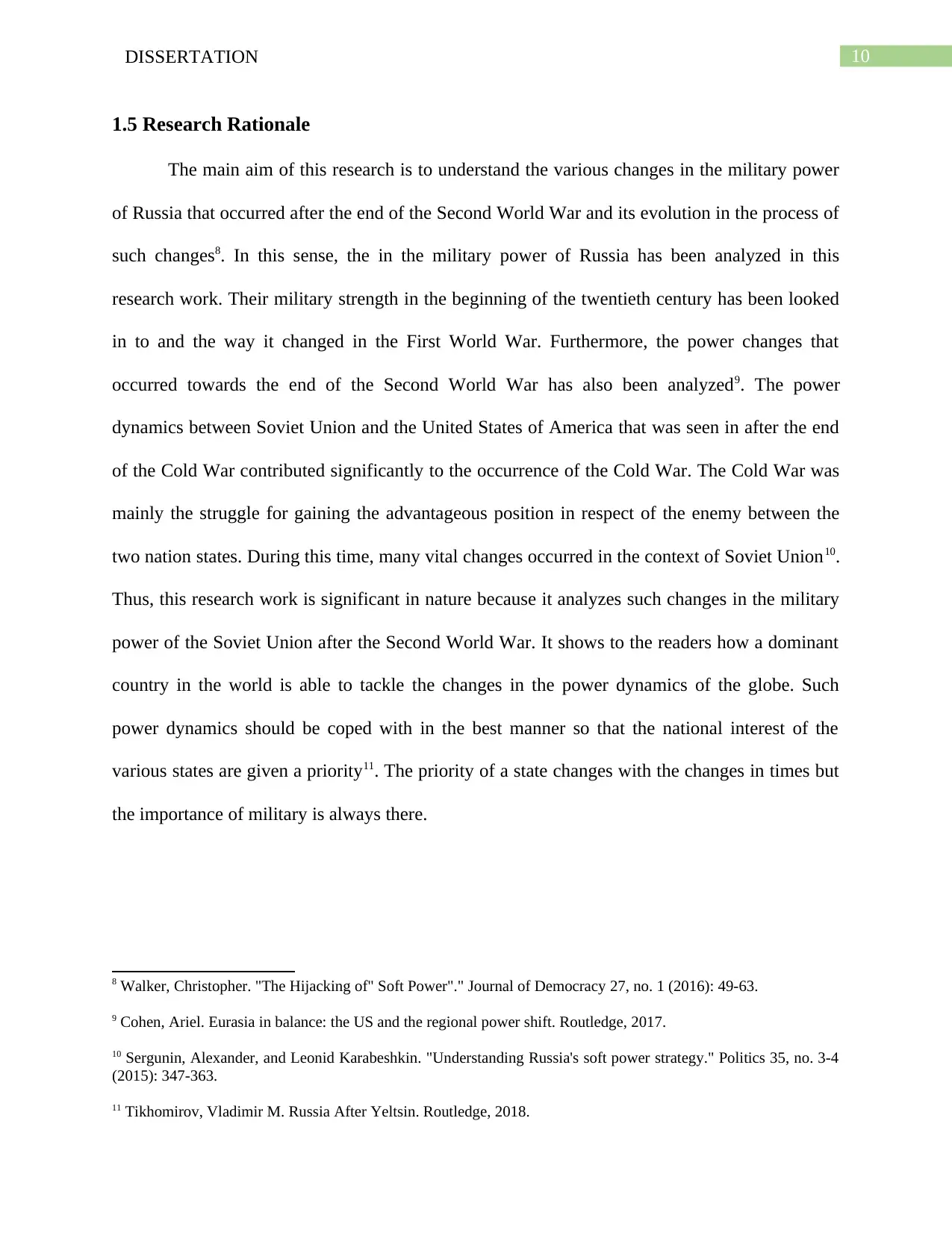
10DISSERTATION
1.5 Research Rationale
The main aim of this research is to understand the various changes in the military power
of Russia that occurred after the end of the Second World War and its evolution in the process of
such changes8. In this sense, the in the military power of Russia has been analyzed in this
research work. Their military strength in the beginning of the twentieth century has been looked
in to and the way it changed in the First World War. Furthermore, the power changes that
occurred towards the end of the Second World War has also been analyzed9. The power
dynamics between Soviet Union and the United States of America that was seen in after the end
of the Cold War contributed significantly to the occurrence of the Cold War. The Cold War was
mainly the struggle for gaining the advantageous position in respect of the enemy between the
two nation states. During this time, many vital changes occurred in the context of Soviet Union10.
Thus, this research work is significant in nature because it analyzes such changes in the military
power of the Soviet Union after the Second World War. It shows to the readers how a dominant
country in the world is able to tackle the changes in the power dynamics of the globe. Such
power dynamics should be coped with in the best manner so that the national interest of the
various states are given a priority11. The priority of a state changes with the changes in times but
the importance of military is always there.
8 Walker, Christopher. "The Hijacking of" Soft Power"." Journal of Democracy 27, no. 1 (2016): 49-63.
9 Cohen, Ariel. Eurasia in balance: the US and the regional power shift. Routledge, 2017.
10 Sergunin, Alexander, and Leonid Karabeshkin. "Understanding Russia's soft power strategy." Politics 35, no. 3-4
(2015): 347-363.
11 Tikhomirov, Vladimir M. Russia After Yeltsin. Routledge, 2018.
1.5 Research Rationale
The main aim of this research is to understand the various changes in the military power
of Russia that occurred after the end of the Second World War and its evolution in the process of
such changes8. In this sense, the in the military power of Russia has been analyzed in this
research work. Their military strength in the beginning of the twentieth century has been looked
in to and the way it changed in the First World War. Furthermore, the power changes that
occurred towards the end of the Second World War has also been analyzed9. The power
dynamics between Soviet Union and the United States of America that was seen in after the end
of the Cold War contributed significantly to the occurrence of the Cold War. The Cold War was
mainly the struggle for gaining the advantageous position in respect of the enemy between the
two nation states. During this time, many vital changes occurred in the context of Soviet Union10.
Thus, this research work is significant in nature because it analyzes such changes in the military
power of the Soviet Union after the Second World War. It shows to the readers how a dominant
country in the world is able to tackle the changes in the power dynamics of the globe. Such
power dynamics should be coped with in the best manner so that the national interest of the
various states are given a priority11. The priority of a state changes with the changes in times but
the importance of military is always there.
8 Walker, Christopher. "The Hijacking of" Soft Power"." Journal of Democracy 27, no. 1 (2016): 49-63.
9 Cohen, Ariel. Eurasia in balance: the US and the regional power shift. Routledge, 2017.
10 Sergunin, Alexander, and Leonid Karabeshkin. "Understanding Russia's soft power strategy." Politics 35, no. 3-4
(2015): 347-363.
11 Tikhomirov, Vladimir M. Russia After Yeltsin. Routledge, 2018.
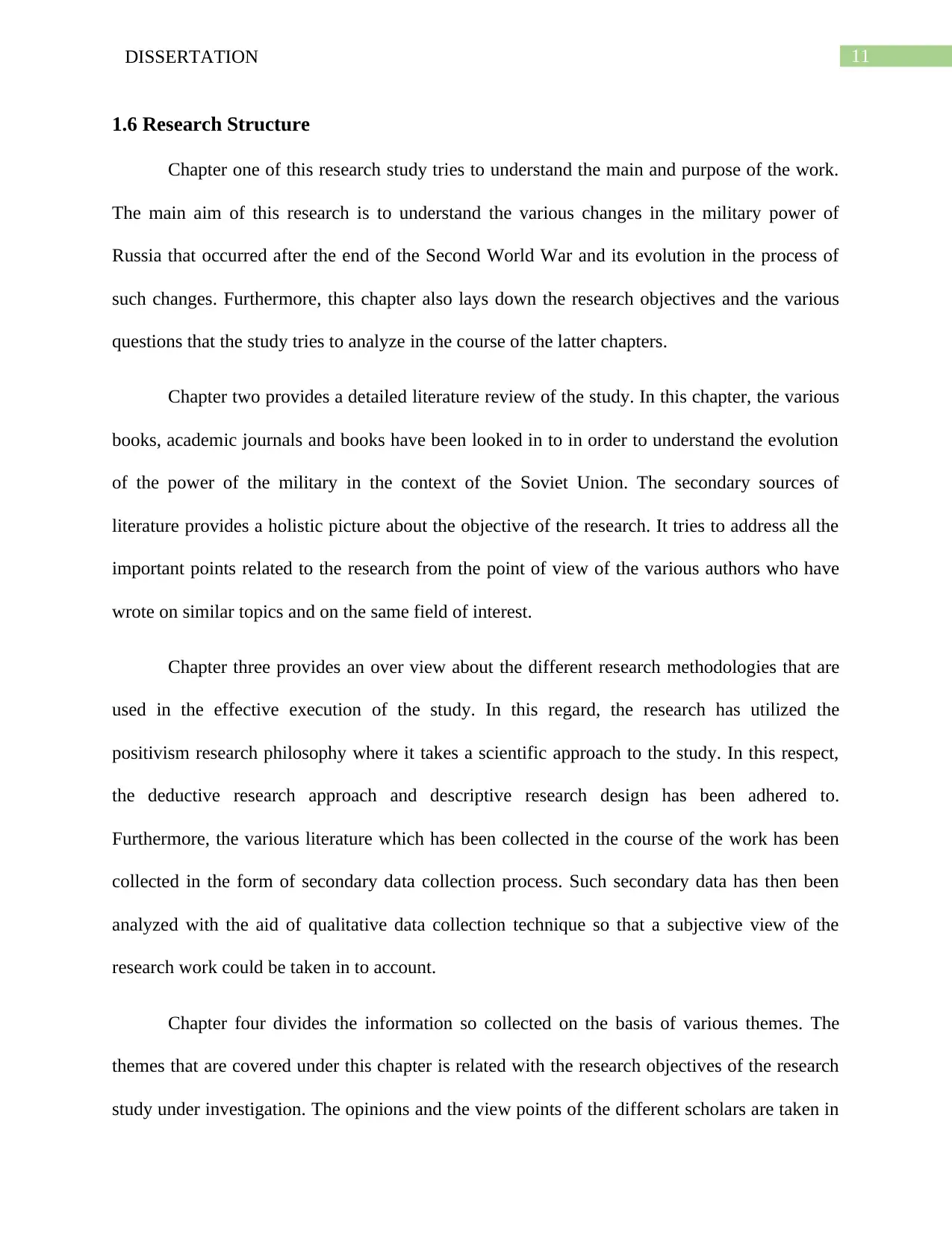
11DISSERTATION
1.6 Research Structure
Chapter one of this research study tries to understand the main and purpose of the work.
The main aim of this research is to understand the various changes in the military power of
Russia that occurred after the end of the Second World War and its evolution in the process of
such changes. Furthermore, this chapter also lays down the research objectives and the various
questions that the study tries to analyze in the course of the latter chapters.
Chapter two provides a detailed literature review of the study. In this chapter, the various
books, academic journals and books have been looked in to in order to understand the evolution
of the power of the military in the context of the Soviet Union. The secondary sources of
literature provides a holistic picture about the objective of the research. It tries to address all the
important points related to the research from the point of view of the various authors who have
wrote on similar topics and on the same field of interest.
Chapter three provides an over view about the different research methodologies that are
used in the effective execution of the study. In this regard, the research has utilized the
positivism research philosophy where it takes a scientific approach to the study. In this respect,
the deductive research approach and descriptive research design has been adhered to.
Furthermore, the various literature which has been collected in the course of the work has been
collected in the form of secondary data collection process. Such secondary data has then been
analyzed with the aid of qualitative data collection technique so that a subjective view of the
research work could be taken in to account.
Chapter four divides the information so collected on the basis of various themes. The
themes that are covered under this chapter is related with the research objectives of the research
study under investigation. The opinions and the view points of the different scholars are taken in
1.6 Research Structure
Chapter one of this research study tries to understand the main and purpose of the work.
The main aim of this research is to understand the various changes in the military power of
Russia that occurred after the end of the Second World War and its evolution in the process of
such changes. Furthermore, this chapter also lays down the research objectives and the various
questions that the study tries to analyze in the course of the latter chapters.
Chapter two provides a detailed literature review of the study. In this chapter, the various
books, academic journals and books have been looked in to in order to understand the evolution
of the power of the military in the context of the Soviet Union. The secondary sources of
literature provides a holistic picture about the objective of the research. It tries to address all the
important points related to the research from the point of view of the various authors who have
wrote on similar topics and on the same field of interest.
Chapter three provides an over view about the different research methodologies that are
used in the effective execution of the study. In this regard, the research has utilized the
positivism research philosophy where it takes a scientific approach to the study. In this respect,
the deductive research approach and descriptive research design has been adhered to.
Furthermore, the various literature which has been collected in the course of the work has been
collected in the form of secondary data collection process. Such secondary data has then been
analyzed with the aid of qualitative data collection technique so that a subjective view of the
research work could be taken in to account.
Chapter four divides the information so collected on the basis of various themes. The
themes that are covered under this chapter is related with the research objectives of the research
study under investigation. The opinions and the view points of the different scholars are taken in
⊘ This is a preview!⊘
Do you want full access?
Subscribe today to unlock all pages.

Trusted by 1+ million students worldwide
1 out of 69
Related Documents
Your All-in-One AI-Powered Toolkit for Academic Success.
+13062052269
info@desklib.com
Available 24*7 on WhatsApp / Email
![[object Object]](/_next/static/media/star-bottom.7253800d.svg)
Unlock your academic potential
Copyright © 2020–2025 A2Z Services. All Rights Reserved. Developed and managed by ZUCOL.





